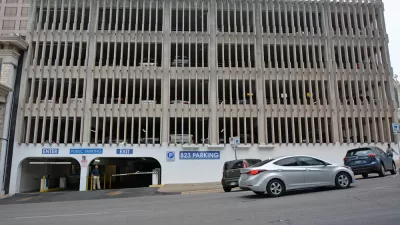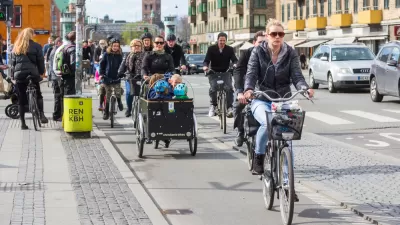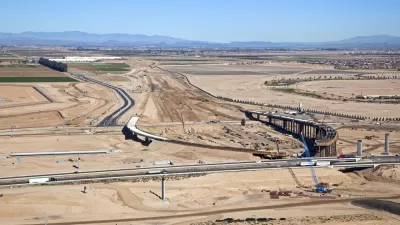Government played a big role in creating the car-centric United States that exists today. Climate change requires that government take the lead in reducing automobile dominance.

An article by Gabby Birenbaum poses the question in the headline, first summarizing the pressing need for Americans to drive less.
Data from the EPA shows that the transportation sector is actually the biggest source of pollution in the US, and that light-duty vehicles (or passenger cars) are responsible for 58 percent of those emissions.
Residents in the most urban areas, which theoretically should reduce per capita emissions by delivering the benefits of density: alternatives to automobile transportation and proximity to jobs. "According to a 2021 study published in Frontiers, Houston, Chicago, and Los Angeles have some of the highest per-capita emissions totals in the world," according to Birenbaum. "The study broke down cities’ emissions based on sector, using the most recently available data (from 2009 and 2010), and found a large portion of those emissions come from transportation."
Breaking the habit of driving to reduce carbon emissions is hard—despite the pressing need—because so many U.S. cities are built for driving. "Biking and walking are often not options, and public transit, where it exists, does not typically serve trips that do not involve going from a city’s outskirts to its downtown or back," writes Birenbaum.
Despite the depth and breadth of the challenge, Birenbaum focuses on the potential for local authorities to "create a safer, more democratized transportation ecosystem" and provide a significantly positive contribution to the effort to reduce carbon emissions. The prescriptions offered by Birenbaum, with more detail provided in the source article are: 1) Make streets safer for bikes and pedestrians, 2) end single family zoning to encourage mixed-use development, and 3) make drivers pay the cost of driving.
Notably, these prescriptions are seemingly diametrically opposed to the housing preferences of the majority of Americans according to the results of a post-pandemic survey by the Pew Research Center published earlier in the summer of 2021.
FULL STORY: How to end the American obsession with driving

Maui's Vacation Rental Debate Turns Ugly
Verbal attacks, misinformation campaigns and fistfights plague a high-stakes debate to convert thousands of vacation rentals into long-term housing.

Planetizen Federal Action Tracker
A weekly monitor of how Trump’s orders and actions are impacting planners and planning in America.

San Francisco Suspends Traffic Calming Amidst Record Deaths
Citing “a challenging fiscal landscape,” the city will cease the program on the heels of 42 traffic deaths, including 24 pedestrians.

Defunct Pittsburgh Power Plant to Become Residential Tower
A decommissioned steam heat plant will be redeveloped into almost 100 affordable housing units.

Trump Prompts Restructuring of Transportation Research Board in “Unprecedented Overreach”
The TRB has eliminated more than half of its committees including those focused on climate, equity, and cities.

Amtrak Rolls Out New Orleans to Alabama “Mardi Gras” Train
The new service will operate morning and evening departures between Mobile and New Orleans.
Urban Design for Planners 1: Software Tools
This six-course series explores essential urban design concepts using open source software and equips planners with the tools they need to participate fully in the urban design process.
Planning for Universal Design
Learn the tools for implementing Universal Design in planning regulations.
Heyer Gruel & Associates PA
JM Goldson LLC
Custer County Colorado
City of Camden Redevelopment Agency
City of Astoria
Transportation Research & Education Center (TREC) at Portland State University
Jefferson Parish Government
Camden Redevelopment Agency
City of Claremont





























